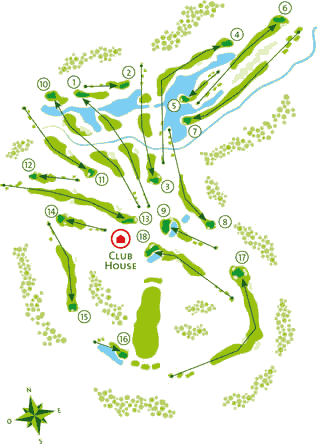Hole 1 (Par 5)
458
437
392
Strong hitters may be tempted to reach the green in just two shots on this opening hole. However, the two water hazards may result in a lay up which will leave a short approach into the green.
Hole 2 (Par 3)
152
142
92
Careful club selection is required on this hole due to the length of the green. With a bunker on the left and a water hazard to the right both awaiting a wayward tee shot.
Hole 3 (Par 4)
413
369
285
Another hole where the club selection from the tee is necessary due to water hazard crossing the fairway. Also the bunkers on the left and right of the green make accuracy of importance for the approach shot.
Hole 4 (Par 5)
497
427
380
This dogleg hole requires strategic play by the golfer. Club selection depending upon the wind direction and the line taken from the tee are essential play. Beware of the water hazard on the right which runs the entire length of the hole.
Hole 5 (Par 3)
143
129
91
Distance control is of paramount importance on this demanding hole as the green is well protected by water.
Hole 6 (Par 4)
416
379
319
All the par 4’s on Quinta do Vale need a great deal of precision judgement. Attention should be paid to the bunker on the right and water to the left of the fairway.
Hole 7 (Par 5)
520
499
433
The water hazards on this seven hole make the second shot essential for a good score. The more daring the second shot which will leave a much easier approach and then the chance of a birdie.
Hole 8 (Par 4)
365
342
252
The fairway on the eight hole slopes from right to left on this dogleg left. An undulating green makes club selection for the approach shot difficult and then can result in some testing putts.
Hole 9 (Par 3)
192
142
95
Hole nine is a fine example of the architect the famous Severiano Ballesteros in his design as the water and bunkers are visible from the tee. These hazards make club selection vital on this hole with the clubhouse as a suitable backdrop.
Hole 10 (Par 5)
562
533
493
This slight dogleg left hole is a distinguishable from the others mainly by its length. Good accuracy and strategic play are very necessary to avoid the many hazards.
Hole 11 (Par 4)
390
369
297
From the tee the hole has water and bunker to the left of the fairway that will attract an errant tee shot. Keep the approach shot below the hole as the green slopes from back to front.
Hole 12 (Par 3)
177
161
122
The twelve hole is a straight forward with no hidden hazards. Be sure to choose the correct club from the tee or you could be faced with a long putt.
Hole 13 (Par 5)
487
479
433
This dogleg right requires accuracy from the tee to avoid the bunkers on the left and right sides of the fairway. Depending upon the wind direction longer hitters may be able to reach this green in two shots and thus creating a birdie opportunity.
Hole 14 (Par 3)
155
151
116
A well struck tee shot is required on this hole to avoid the bunkers which protect the green.
Hole 15 (Par 4)
373
348
275
This uphill fairway hole that requires an accurate approach shot into a long narrow green which slopes severely from back to front.
Hole 16 (Par 3)
112
112
87
Although this sixteenth hole is the shortest on the course it is also very demanding. An accurate tee shot is required to hit the green which is well guarded by water and bunkers.
Hole 17 (Par 5)
474
447
413
The seventeenth hole requires a strong and accurate tee shot on this dogleg left. This will give the player an opportunity in hitting the green in two strokes. However, be aware there are bunkers to the left and right of this large undulating green.
Hole 18 (Par 4)
320
299
275
The magnificent views from this eighteenth tee will enchant any golfer. Distance control is vital as the fairway slopes severely downhill towards the lake in front of the green. This hole was designed specifically with tournaments in mind, as spectators can watch the final shots of the game from both sides of the fairway and also from behind this spectacular green.
